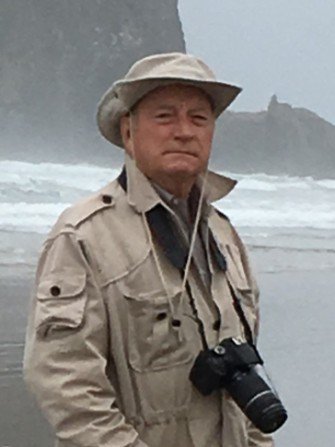-
What inspired you to start writing?
Influences included my mother, a storyteller and a poet, and a college professor urging me to pursue literature. Although I loved literary fiction, I couldn't find time or ability to disengage my technical-business mind of the aerospace/defense industry, until I finally retired from that career.
-
Can you tell us a little about your latest book?
My latest book, "Death in Tomorrow's Shadow" is a murder mystery set in the Arctic Circle at a secretive military base. My background at such a site inspired my storyline and my experience provided authenticity.
-
How do you create your characters?
Having known a lot of "characters" is an advantage. I have traveled worldwide, worked scores of jobs, and became well acquainted with hundreds of people of various personalities and characteristics. Also, each of my grandparents were of dramatically diverse cultures.
-
What does your typical writing day look like?
I retired from industry, sold my cattle herd, and sold half my ranchland, keeping two horses. Travel, enjoying performing arts, and working outdoors on the ranch, usurp most of my time. I only find time to write evenings until late at night or when foul weather excuses me to remain indoors.
-
What has been the most rewarding part of being an indie author?
I feel rewarded in exploring means to market my novels, through websites, social media, bookstores, and library events. As with most authors, however, the richest reward is in reading a complimentary book review from a reader.
-
What’s one challenge you’ve faced in your writing journey?
Popular authors and their publishers buy top billing. Libraries promote the most popular books to attract readers and develop new young readers. Bookstores promote popular books because they sell and make money. It is difficult for new books by unknown authors to gain attention.
-
Do you have any favorite writing tools or apps?
I began with pen and paper but the manuscript became too jumbled and scrambled because I frequently alter the plot, characters, and storyline. I soon shifted to a laptop using Microsoft Word with spell-check. I avoid editing software and A.I. becuse they destroy style and technique.
-
What advice would you give to new or aspiring indie authors?
Expect to sell few of the first several books. Gaining notice on the literary landscape requires much time, effort, expense, and luck, luck being 50,000 tries at a one in 50,000 chance to for a genuine award, a movie offer, or a promoter convinced of your book's potential.
-
How do you handle book promotion as an indie author?
I use social media to present my books, YouTube videos to generate interest, Facebook ads, and I supply free bookmarks to coffee shops and libraries. I've had three radio interviews. I avoid the hundreds of scam artists having book contests for obscure awards and ineffective promo offers.
-
What’s next for you? Are you working on a new book?
"The Settled and the Seekers," set on iconic Route 66 in 1991. Mostly replaced or bypassed with interstate highways, a tragedy along a forgotten rural segment of the “Mother Road” conjures a haunting, dramatic, and melancholic back-story at that same location in 1954, opening old wounds and buried secrets.
-
How are readers responding to your novels?
My books rate above 4.6 on a scale of 5, on Amazon, Goodreads, and Barnes & Noble, reviews are overwhelmingly favorable, but no independent author without a fortune can compete with the advertising and attention relalized by popular authors and their publishing companies.
-
What changes or influences do you forsee that Artificial Intelligence will have on literature?
Many popular authors use ghost writers, monopolizing the market with several new novels yearly, whereas conventional writers may take years to write a single novel. AI will allow publishers to contrive a collection of fictitious writers, each producing several books a year at a fraction of the costs of ghost-written novels. Profits will soar, even sidelining today's pretender popular writers.


